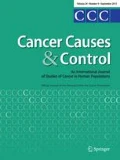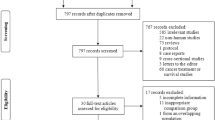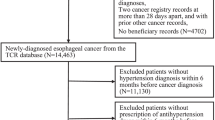Abstract
Purpose
We aim to investigate the association between angiotensin-converting enzyme inhibitors (ACEIs)/angiotensin receptor blockers (ARBs) therapy and colorectal cancer (CRC) by conducting a systematic review with meta-analysis.
Methods
Literature was searched on PubMed, Scopus, and the Cochrane library to identify relevant studies evaluating ACEIs/ARBs therapy and risk of CRC incidence or survival of CRC patients. Pooled risk ratio (RR) with 95 % confidence intervals was calculated for the association between ACEIs/ARBs and CRC risk and mortality.
Results
Eleven observational studies were included in the systematic review. A meta-analysis of six studies totaling 113,048 individuals indicated a 6 % decreased risk of CRC in ACEIs/ARBs users compared to non-users (95 % CI 0.89–0.98). In the four case–control studies, individuals using ACEIs/ARBs were associated with a 6 % decreased risk of CRC (95 % CI 0.90–0.99). The meta-analysis of three studies investigating the relationship between ACEIs/ARBs and survival of CRC did not show a significantly decreased mortality in ACEIs/ARBs users (RR 0.81, 95 % CI 0.60–1.09). Seven studies evaluated the dose–response relationship between ACEIs/ARBs therapy and CRC, and two of them showed that the association was related to longer duration and higher dose.
Conclusions
CEIs/ARBs therapy might be associated with a reduce risk of CRC development, but whether use of these medications improves the outcomes of CRC remains unknown. Large-scale and more robust studies are needed to further explore this association.




Similar content being viewed by others
References
Jemal A, Bray F, Center MM, Ferlay J, Ward E et al (2011) Global cancer statistics. CA Cancer J Clin 61:69–90
Andrieu N, Launoy G, Guillois R, Ory-Paoletti C, Gignoux M (2003) Familial relative risk of colorectal cancer: a population-based study. Eur J Cancer 39:1904–1911
Klabunde CN, Lanier D, Nadel MR, McLeod C, Yuan G et al (2009) Colorectal cancer screening by primary care physicians: recommendations and practices, 2006-2007. Am J Prev Med 37:8–16
Mandel JS, Bond JH, Church TR, Snover DC, Bradley GM et al (1993) Reducing mortality from colorectal cancer by screening for fecal occult blood. Minn Colon Cancer Control Study N Engl J Med 328:1365–1371
Vogelaar I, van Ballegooijen M, Schrag D, Boer R, Winawer SJ et al (2006) How much can current interventions reduce colorectal cancer mortality in the US? Mortality projections for scenarios of risk-factor modification, screening, and treatment. Cancer 107:1624–1633
Force USPST (2008) Screening for colorectal cancer: US preventive services task force recommendation statement. Ann Intern Med 149:627–637
Lever AF, Hole DJ, Gillis CR, McCallum IR, McInnes GT et al (1998) Do inhibitors of angiotensin-I-converting enzyme protect against risk of cancer? Lancet 352:179–184
Huang CC, Chan WL, Chen YC, Chen TJ, Lin SJ et al (2011) Angiotensin II receptor blockers and risk of cancer in patients with systemic hypertension. Am J Cardiol 107:1028–1033
Mc Menamin UC, Murray LJ, Cantwell MM, Hughes CM (2012) Angiotensin-converting enzyme inhibitors and angiotensin receptor blockers in cancer progression and survival: a systematic review. Cancer Causes Control 23:221–230
Friis S, Sorensen HT, Mellemkjaer L, McLaughlin JK, Nielsen GL et al (2001) Angiotensin-converting enzyme inhibitors and the risk of cancer: a population-based cohort study in Denmark. Cancer 92:2462–2470
Sipahi I, Debanne SM, Rowland DY, Simon DI, Fang JC (2010) Angiotensin-receptor blockade and risk of cancer: meta-analysis of randomised controlled trials. Lancet Oncol 11:627–636
Song M, Giovannucci EL (2014) Antihypertension and colorectal cancer prevention: getting two birds with one stone? J Natl Cancer Inst 106:djt438
Moher D, Liberati A, Tetzlaff J, Altman DG, Group P (2009) Preferred reporting items for systematic reviews and meta-analyses: the PRISMA statement. Ann Intern Med 151(264–269):W264
Stang A (2010) Critical evaluation of the Newcastle-Ottawa scale for the assessment of the quality of nonrandomized studies in meta-analyses. Eur J Epidemiol 25:603–605
Higgins JP, Thompson SG (2002) Quantifying heterogeneity in a meta-analysis. Stat Med 21:1539–1558
Higgins JP, Thompson SG, Deeks JJ, Altman DG (2003) Measuring inconsistency in meta-analyses. BMJ 327:557–560
Thornton A, Lee P (2000) Publication bias in meta-analysis: its causes and consequences. J Clin Epidemiol 53:207–216
Egger M, Davey Smith G, Schneider M, Minder C (1997) Bias in meta-analysis detected by a simple, graphical test. BMJ 315:629–634
Kedika R, Patel M, Pena Sahdala HN, Mahgoub A, Cipher D et al (2011) Long-term use of angiotensin converting enzyme inhibitors is associated with decreased incidence of advanced adenomatous colon polyps. J Clin Gastroenterol 45:e12–e16
Engineer DR, Burney BO, Hayes TG, Garcia JM (2013) Exposure to ACEI/ARB and beta-blockers is associated with improved survival and decreased tumor progression and hospitalizations in patients with advanced colon cancer. Transl Oncol 6:539–545
Holmes S, Griffith EJ, Musto G, Minuk GY (2013) Antihypertensive medications and survival in patients with cancer: a population-based retrospective cohort study. Cancer Epidemiol 37:881–885
van der Knaap R, Siemes C, Coebergh JW, van Duijn CM, Hofman A et al (2008) Renin-angiotensin system inhibitors, angiotensin I-converting enzyme gene insertion/deletion polymorphism, and cancer: the Rotterdam Study. Cancer 112:748–757
Assimes TL, Elstein E, Langleben A, Suissa S (2008) Long-term use of antihypertensive drugs and risk of cancer. Pharmacoepidemiol Drug Saf 17:1039–1049
Azoulay L, Assimes TL, Yin H, Bartels DB, Schiffrin EL et al (2012) Long-term use of angiotensin receptor blockers and the risk of cancer. PLoS One 7:e50893
Boudreau DM, Koehler E, Rulyak SJ, Haneuse S, Harrison R et al (2008) Cardiovascular medication use and risk for colorectal cancer. Cancer Epidemiol Biomark Prev 17:3076–3080
Makar GA, Holmes JH, Yang YX (2014) Angiotensin-converting enzyme inhibitor therapy and colorectal cancer risk. J Natl Cancer Inst 106:djt374
Cardwell CR, Mc Menamin UC, Hicks BM, Hughes C, Cantwell MM et al (2014) Drugs affecting the renin-angiotensin system and survival from cancer: a population based study of breast, colorectal and prostate cancer patient cohorts. BMC Med 12:28
Mansouri D, McMillan DC, Roxburgh CS, Crighton EM, Horgan PG (2013) The impact of aspirin, statins and ACE-inhibitors on the presentation of colorectal neoplasia in a colorectal cancer screening programme. Br J Cancer 109:249–256
Bardou M, Barkun A, Martel M (2010) Effect of statin therapy on colorectal cancer. Gut 59:1572–1585
Dube C, Rostom A, Lewin G, Tsertsvadze A, Barrowman N et al (2007) The use of aspirin for primary prevention of colorectal cancer: a systematic review prepared for the US preventive services task force. Ann Intern Med 146:365–375
Yasumaru M, Tsuji S, Tsujii M, Irie T, Komori M et al (2003) Inhibition of angiotensin II activity enhanced the antitumor effect of cyclooxygenase-2 inhibitors via insulin-like growth factor I receptor pathway. Cancer Res 63:6726–6734
Deshayes F, Nahmias C (2005) Angiotensin receptors: a new role in cancer? Trends Endocrinol Metab 16:293–299
Greene AS, Amaral SL (2002) Microvascular angiogenesis and the renin-angiotensin system. Curr Hypertens Rep 4:56–62
George AJ, Thomas WG, Hannan RD (2010) The renin-angiotensin system and cancer: old dog, new tricks. Nat Rev Cancer 10:745–759
Kubota M, Shimizu M, Sakai H, Yasuda Y, Ohno T et al (2011) Renin-angiotensin system inhibitors suppress azoxymethane-induced colonic preneoplastic lesions in C57BL/KsJ-db/db obese mice. Biochem Biophys Res Commun 410:108–113
Shirakami Y, Shimizu M, Kubota M, Araki H, Tanaka T et al (2014) Chemoprevention of colorectal cancer by targeting obesity-related metabolic abnormalities. World J Gastroenterol 20:8939–8946
Neo JH, Ager EI, Angus PW, Zhu J, Herath CB et al (2010) Changes in the renin angiotensin system during the development of colorectal cancer liver metastases. BMC Cancer 10:134
Wen SW, Ager EI, Neo J, Christophi C (2013) The renin angiotensin system regulates Kupffer cells in colorectal liver metastases. Cancer Biol Ther 14:720–727
Luo Y, Ohmori H, Shimomoto T, Fujii K, Sasahira T et al (2011) Anti-angiotensin and hypoglycemic treatments suppress liver metastasis of colon cancer cells. Pathobiology 78:285–290
Fearon ER, Vogelstein B (1990) A genetic model for colorectal tumorigenesis. Cell 61:759–767
Conflict of interest
All authors have declared that they have no conflict of interest.
Author information
Authors and Affiliations
Corresponding author
Rights and permissions
About this article
Cite this article
Dai, YN., Wang, JH., Zhu, JZ. et al. Angiotensin-converting enzyme inhibitors/angiotensin receptor blockers therapy and colorectal cancer: a systematic review and meta-analysis. Cancer Causes Control 26, 1245–1255 (2015). https://doi.org/10.1007/s10552-015-0617-1
Received:
Accepted:
Published:
Issue Date:
DOI: https://doi.org/10.1007/s10552-015-0617-1




